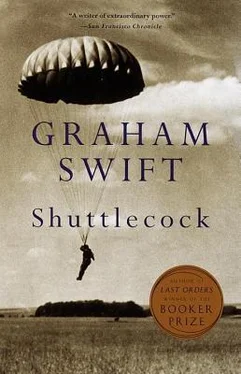And then in the Tube the next morning — you see the effect the Tube has — I gave in. My fellow passengers would have had their satisfaction that day — they’d have seen a man with his defences down. The first thing I did when I got into work was to go and see Quinn. And he was all understanding. ‘My dear chap — I’m so sorry. Yes, have the rest of the week off — take as much time as you like.’ He made me sit down. He sat opposite me in his leather chair. And I couldn’t help thinking that Dad had been found, the day before in his office, in his leather chair, which was bigger even than Quinn’s. There was a moment — just as I began to explain things — when Quinn’s eyes seemed to sharpen and brighten a little, like a doctor’s, who while he is listening to you describe your symptoms, suddenly becomes interested in your appearance, in the way you are talking. But his manner, like a good doctor’s too, was considerate and patient. I actually felt grateful for his concern (what sympathy could I get from Marian, who had never had any for Dad?). And, to tell you the truth, all that ‘dear chapping’ and ‘dear fellowing’, which in its old-fashioned way, might have been just glib lip-service, that comforted me more than anything. It made me think of the suave, chummy talk I used to hear outside the club-house when Dad and his friends came in from their golf for their drinks.…
But what happened after this? I took the rest of that week off. After my return to work, Quinn inquired every so often, in a perfectly friendly manner, after Dad. The ice was breaking; I seemed to have found favour. But then — after several weeks — his attitude began suddenly to harden. It was not just that he returned to his old self again; he became more severe, more tyrannical than ever before. The subject of Dad got dropped altogether; it became a sort of taboo. It was during this time that I began positively to feel that there was an evil streak in Quinn and it was directed specifically at me. Was all this a delusion brought about by my own unsettled state of mind? Or was it a consequence I ought to have foreseen? Had I made a mistake in letting Quinn peep so far into my private life? Wasn’t this just the sort of thing a man like him would seize upon? Had I been taken in by all those words of consolation and that plump, dimpled face — like the face of some complacent abbot?
I only knew that something odd was going on, and when that first jumbled dossier arrived on my desk, my immediate instinct was one of caution. All right, call it cowardice if you like. What if Quinn were baiting me? What if he were trying to tempt me into some hasty assumption that would catch me out? I responded judiciously. I pretended to chase up the contents of the files — or rather I genuinely looked for some hidden meaning behind the unrelated items. I wrote at the end of a rather garbled report: ‘the evidence is fragmentary and justifies no significant conclusions’ (my pompous style again) and I returned it to Quinn. No comment. But when, after another three weeks or so, I received a second dossier of a similar kind, I knew this was not a matter of some chance error or quirk. I began to think twice about the files I had already occasionally, but without leaping to any conclusions, found missing, but which now I felt must be obscurely connected with these strange dossiers. Quinn was up to something. Perhaps it involved the whole department. But why was Quinn, as it were, letting me know about it? Why was he daring me to enter in on it — or expose it? I looked around at my colleagues for any signs that their suspicions had also been aroused or that they had been given similar inquiries to work on. But the papers I sometimes surreptitiously leafed through on their desks, their unchanged, unconstrained chatter in the pub at lunch-times, made me sure that I was alone. I began to draw apart from them at this time — from Vic and Eric, with whom I used to discuss marital ups and downs, plans for summer holidays — and no doubt they noticed it. But they knew vaguely what had happened to Dad and they put my reserve down to that.
I handled the second dossier in the same way as the first. I spread the items out on my desk and pretended to be engrossed. But I remember that while I was ‘busy’ at it I looked up once, and there was Quinn, at his glass panel, staring down, not at our office at large, but directly at me. He was wearing a black pin-stripe, with a small flower — a little pale yellow rose — in his lapel. I’d never seen Quinn wear a flower before; he wasn’t the sort of man to wear flowers — though quite often, after this, I noticed he wore one. When I looked up he didn’t even turn his head away till some seconds had passed. He had a fascinated look on his face; and I’d swear he was simply relishing my perplexity.
And another thing. It was at this time too that the rumour got around — it was one of those rumours that come down slowly from high places; it wasn’t given out by Quinn himself, though he never denied it — that Quinn would be retiring the next summer but one, when, so we learnt, he would be sixty-four. This was a new retirement scheme to allow fresh staff into higher positions. Quinn still had the option of working on till sixty-five — or even longer — if he wished. Naturally, I had an interest in this. There was a chance — a very slim and remote one — that I might be offered Quinn’s job, but this would depend almost entirely on Quinn’s own recommendation. I was now in the quandary which I have described already. If I challenged Quinn over the mysterious goings-on in the office, would that instantly ruin my promotion chances? Should I hold my tongue and knuckle under? Or was it conceivable that those mysterious goings-on (one couldn’t deny how they coincided with the retirement rumours) were some elaborate test of my initiative: if I didn’t take some stand about them would I then wreck my chances? And yet again, didn’t my duty lie outside the whole self-interested field of my promotion prospects? If I suspected something untoward in the department, shouldn’t I act promptly to denounce it? You hear about corruption in official places — about mismanagement, leaks of information. You hear all sorts of stories.
Would I be writing all this down now, trying to clarify matters in words, if I had acted on any of these assumptions? No. The question of Quinn’s retirement only added to my existing confusion. Sometimes — usually in that brief, green breathing-space on my way home, between the Underground station and our house — I would reflect that, in the possibility of exposing single-handedly some malpractice in the office, lay the opportunity of bringing into my life a faint note of daring, decision — integrity. But then, supposing my gamble failed? And I wanted that promotion. I wanted to come home one day and say to Marian and the kids: I’ve got a better job, an important job, I’ll be better now. (Look what I actually did when Quinn broke the news.) And then it would strike me that there were really two promotions I wanted. For, quite apart from prospects at work, I wanted to step into Dad’s shoes. Now his mind was gone, now Dad was no more: I wanted what he had had. To be even with him. And then there was Quinn. Now and then in the office, when I came into contact with him, I would seethe inwardly with a mixture of hatred, envy and a desire for certainty. I wanted his job. I wanted to sit in his leather chair. I wanted to look down, like him, through his glass panel, at the underlings I had once worked beside. And yet it seemed (and I still feel this now) that what I wanted was not so much the promotion itself, but to be in a position where I would know ; where I would no longer be the victim, the dupe, no longer be in the dark.
Читать дальше












